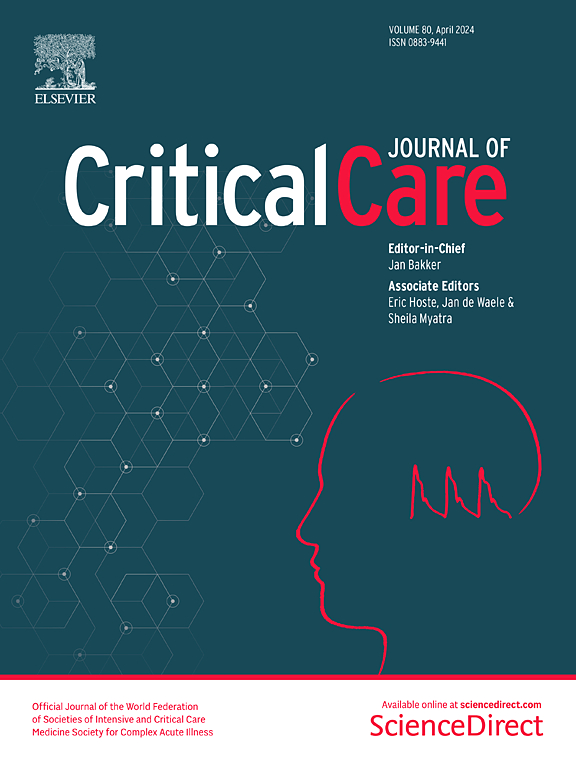长期抑郁症、后抑郁症和后重症监护综合症之间有何关联?基于现有研究文献的概念方法
IF 8.8
1区 医学
Q1 CRITICAL CARE MEDICINE
引用次数: 0
摘要
朗-科维综合征(Long-Covid,LC)、后脓肿综合征(Post-Sepsis-Syndrome,PSS)和后重症监护综合征(Post-Intensive-Care-Syndrome,PICS)在临床表现上有明显的重叠。然而,目前还不清楚它们是可能同时出现在同一患者身上的不同综合征,还是根据患者病史和主治医生的专业视角而命名的描述相似症状的三个不同标签。因此,我们回顾了目前关于 LC、PSS 和 PICS 之间关系的文献。迄今为止,由于这三种综合征在临床表现上具有相似性,它们在认知、心理和躯体方面都有损伤,只是发生的概率不同,个体表现也不尽相同,因此无法可靠地区分。此外,缺乏特定的诊断工具也阻碍了诊断。可以得出的结论是,与 COVID-19 病程较轻的患者相比,COVID-19 败血症后的幸存者可能会出现更频繁、更严重的后遗症,而且会出现一些 COVID-19 败血症特有的后遗症,如急性病后 30 天内静脉血栓栓塞的风险增加,而其他原因引起的败血症则较少出现这种情况。利用 PICS、PSS 和 LC 治疗的协同作用,以及从一般感染相关慢性疾病中获得的经验,患者可能会从中获益。厘清分子病理机制可使未来的靶向治疗超越对症治疗。本文章由计算机程序翻译,如有差异,请以英文原文为准。
How are Long-Covid, Post-Sepsis-Syndrome and Post-Intensive-Care-Syndrome related? A conceptional approach based on the current research literature
Long-Covid (LC), Post-Sepsis-Syndrome (PSS) and Post-Intensive-Care-Syndrome (PICS) show remarkable overlaps in their clinical presentation. Nevertheless, it is unclear if they are distinct syndromes, which may co-occur in the same patient, or if they are three different labels to describe similar symptoms, assigned on the basis on patient history and professional perspective of the treating physician. Therefore, we reviewed the current literature on the relation between LC, PSS and PICS. To date, the three syndromes cannot reliably be distinguished due similarities in clinical presentation as they share the cognitive, psychological and physical impairments with only different probabilities of occurrence and a heterogeneity in individual expression. The diagnosis is furthermore hindered by a lack of specific diagnostic tools. It can be concluded that survivors after COVID-19 sepsis likely have more frequent and more severe consequences than patients with milder COVID-19 courses, and that are some COVID-19-specific sequelae, e.g. an increased risk for venous thromboembolism in the 30 days after the acute disease, which occur less often after sepsis of other causes. Patients may profit from leveraging synergies from PICS, PSS and LC treatment as well as from experiences gained from infection-associated chronic conditions in general. Disentangling molecular pathomechanisms may enable future targeted therapies that go beyond symptomatic treatment.
求助全文
通过发布文献求助,成功后即可免费获取论文全文。
去求助
来源期刊

Critical Care
医学-危重病医学
CiteScore
20.60
自引率
3.30%
发文量
348
审稿时长
1.5 months
期刊介绍:
Critical Care is an esteemed international medical journal that undergoes a rigorous peer-review process to maintain its high quality standards. Its primary objective is to enhance the healthcare services offered to critically ill patients. To achieve this, the journal focuses on gathering, exchanging, disseminating, and endorsing evidence-based information that is highly relevant to intensivists. By doing so, Critical Care seeks to provide a thorough and inclusive examination of the intensive care field.
 求助内容:
求助内容: 应助结果提醒方式:
应助结果提醒方式:


